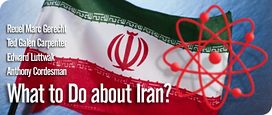Let’s stipulate that Mr. Gerecht and I both believe the current Iranian regime is repulsive and difficult to deal with–a point that is apparent without Mr. Gerecht repeatedly touting his knowledge of domestic Iranian politics. But the nature of the regime is only one factor among many in determining what kind of foreign policy the United States should adopt toward Tehran. Mr. Gerecht acts as though that is the only relevant consideration.
The most troubling feature of his latest post, though, is his assertion that the United States can attack Iran while inflicting or incurring few casualties. That is the pervasive fantasy of hawks who are reluctant to acknowledge the human costs of the military crusades they embrace. Amazingly, he cites the Iraq experience as evidence that the United States can wage such an antiseptic war. Yet even President Bush admitted in December 2005 that approximately 30,000 Iraqis had died in the ongoing conflict. The UN has documented that at least another 14,000 civilians have perished in the first six months of 2006. That would seem to fit my description of “tens of thousands” of prospective casualties for an Iranian war. Or does Mr. Gerecht believe the United States can attack Iran and Iran will do NOTHING in response? That notion strains credulity to the breaking point. And if, as is almost certain, Iran does strike back, is he arguing that the United States would not escalate the conflict? It’s hard to imagine Washington just standing by as Iran unleashed Hezbollah on American targets, attacked Israel, or fired on shipping in the Strait of Hormuz. Before asking the American people to incur such risks, Mr. Gerecht needs to do a lot more than make the unsubstantiated allegation that a nuclear-armed Iran could not be deterred, and would therefore be so dangerous that even the cataclysm of preventive war is preferable.
Aside from the issue of Iranian casualties, how many American casualties would Mr. Gerecht find acceptable in a U.S. war against Iran? The Iraq crusade that he sought so eagerly has already consumed more than 2,550 American lives. As that episode demonstrates clearly, Mr. Gerecht and his neoconservative colleagues are adept at starting wars, but they’re not very good at finishing them.
I will ignore his silly allegation that I am naive about the mullahs. I am most curious, though, about his reflexive hostility toward even putting a “grand bargain” on the table. What, exactly, is the harm in proposing such an agreement? If Tehran turned it down, all of the other options would still be available—even Mr. Gerecht’s favorite strategy of unleashing the dogs of war. Proposing a grand bargain would, at the very least, smoke out the Iranians. If they turned it down, we would know for certain that Iran is determined—regardless of any carrots that might be offered—to become a nuclear-weapons state. And if they accepted the deal, we would have a reliable way of preventing them from building a nuclear arsenal. Mr. Gerecht’s opposition to even trying the grand-bargain approach makes sense only if his real goal is forcible regime change (at whatever cost), not stopping Iran’s nuclear program.

